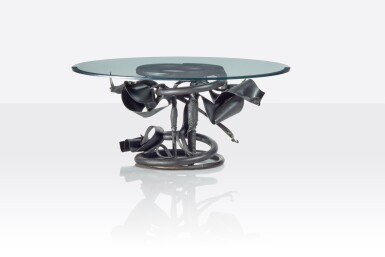Design
Design

Property from the Collection of Hardie Beloff
Albert Paley
Coffee Table
Lot Closed
October 20, 06:00 PM GMT
Estimate
8,000 - 12,000 USD
Lot Details
Description
Property from the Collection of Hardie Beloff
Albert Paley
Coffee Table
1991
from an edition of 15
forged and patinated steel, glass
impressed © PALEY and dated 1991
15 1/2 in. (39.4 cm) high
36 in. (91.4 cm) diameter
Studio Design, Washington, D.C.
Jeffrey M. Kaplan, Washington, D.C.
Freeman's Auction, Philadelphia, 1,000 Years of Collecting: The Jeffrey M. Kaplan Collection, April 6, 2017, lot 450
Acquired from the above by the present owner
Edward Lucie Smith, The Art of Albert Paley, New York, 1996, p. 206, fig. 354
Born in Philadelphia in 1944, American metalsmith Albert Paley began his career in jewelry design before expanding to the large-scale sculpture and furniture for which he is best known today. A defining moment in this progression came in 1974 when he won the Smithsonian Institution’s competition to create the Portal Gates to the Renwick Gallery in Washington, D.C. His work demonstrated an understanding of previous movements, from the sinuous curves of Art Nouveau to the excessive ornament of Rococo, but resulted in a distinctive visual language entirely his own. Following the success of this commission and the national attention it garnered, Paley continued to create more architectural designs and public sculptures, as well as innovative contemporary design and decorative arts.
The present and preceding lots from the collection of Hardie Beloff are superlative examples from Paley’s oeuvre. Both pieces are composed of forged and patinated steel, a material Paley favored: “One of the reasons I was drawn to steel was the aspect of paradox. With forging, rather than a ridged inorganic industrial material, the context is instead an organic form that expresses motion gesture and transformation.” Rather than work from a predetermined sketch of how each piece should turn out, Paley allowed the metal to guide the final design; this is apparent in the structure of both the coffee table and floor lamp as the steel appears to flow naturally and spontaneously into a functional object. The intensely sculptural metal bases are contrasted by a glass tabletop and shade respectively. From the 1990s onward, the combination of these conflicting yet complementary materials fascinated Paley, culminating in a residency at the Corning Museum of Glass in 2014.
